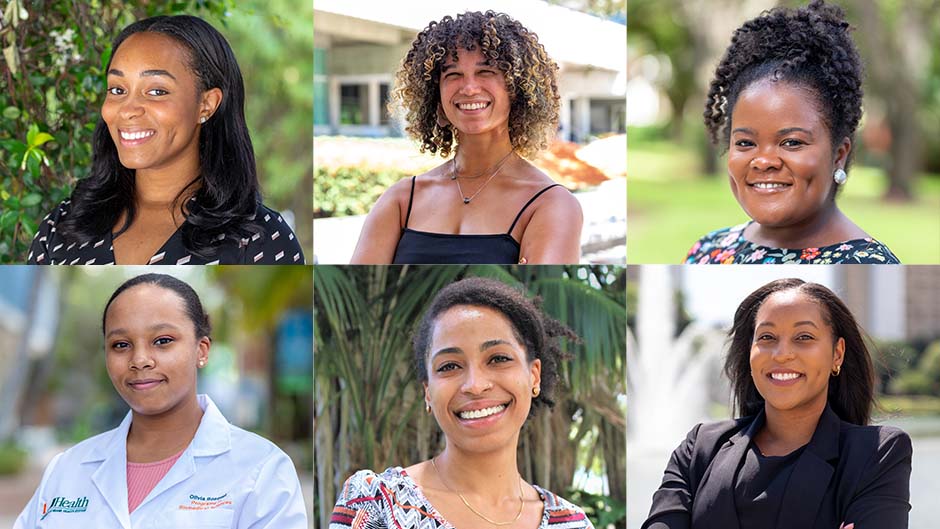Since 1984, the Florida Education Fund's McKnight Doctoral Fellowship Program has collaborated with universities and colleges in Florida to increase the number of Black and Hispanic Ph.D. holders in arts and sciences, business, engineering, health sciences, nursing, and visual and performing arts related disciplines.
In the largest cohort to date at the University of Miami, 13 students have been accepted into the Florida Education Fund’s 2021 McKnight Fellowship Program. The goal of the program is to increase the pool of Black and Hispanic Ph.D. holders who have an interest in teaching at the collegiate level, in hopes of tackling the underrepresentation of those minorities at the faculty level in higher education institutions.
The University of Miami’s Graduate School supports numerous students as they pursue their doctorates. Each year interested students whose end goal aligns with the mission of the McKnight program are encouraged to apply.
The doctoral fellowship awards provide annual tuition up to $5,000 for each of three academic years, plus an annual stipend of $12,000, in addition to attending the McKnight Summer Research and Writing Institute. (Each participating institution provides an additional two years of financial support.) Recipients also will have exclusive access to workshops and conferences during their award year.
Dissertation fellowships give doctoral candidates in STEM-related disciplines up to one year of support based on their exceptional academic achievements, their commitment to careers in teaching and research at the university level, and their engagement in community service. Each award provides a stipend of up to $12,000 in addition to expenses paid to be in the McKnight Summer Research and Writing Institute and all other McKnight-related workshops and conferences.
The following are six of the fellowship awardees who agreed to be interviewed by News@TheU:
Doctoral fellowship awardees:
Olivia Bosquet
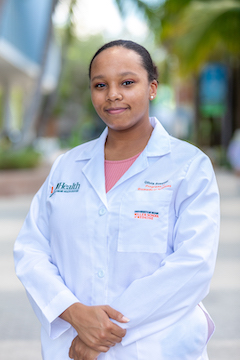 In her first year as a biochemistry and molecular biology Ph.D. student, Olivia Bosquet is a Miami native who earned her master’s degree from the University of Miami in biochemistry and molecular biology.
In her first year as a biochemistry and molecular biology Ph.D. student, Olivia Bosquet is a Miami native who earned her master’s degree from the University of Miami in biochemistry and molecular biology.
Today she works in Professor Sylvia Daunert’s bionanotechnology lab at the Medical Campus.
“The research that I am involved in has to do with molecular diagnostic, specifically point of care diagnostic tests and developing those as well as doing targeted drug delivery using nanoparticles,” said Bosquet. “It’s pretty wide-ranging but all to do with improving medicine and medical devices.”
Prior to this experience, Bosquet wasn’t sure where her passion for research would land her. She knew one thing for certain—that she wanted to be help medicine advance and further develop in whatever way she can.
“I want to help make medicine more accessible to people in areas that don’t really have a lot of high-tech lab equipment,” said Bosquet.
Bosquet is excited to be a part of the McKnight community and looks forward to excelling and sharing information with other like-minded individuals in the program.
“This is a huge honor,” said Bosquet. “It’s all about helping the future of medicine and I’m so glad to be selected to be in a community of people with similar backgrounds and goals. The support the fellowship offers—from writing to navigating mentor/mentee relationships to gaining a whole network of people—that’s exciting.”
Jalyse Cuff
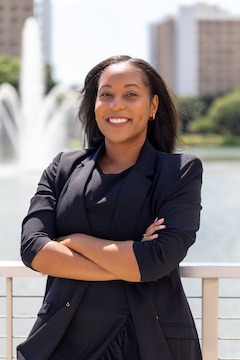 Born and raised in Hollywood, Florida, Jalyse Cuff is quite familiar with climate change and its effects.
Born and raised in Hollywood, Florida, Jalyse Cuff is quite familiar with climate change and its effects.
Upon graduation from Howard University with her bachelor’s degree in biology, Cuff participated in the Oak Ridge Institute of Science and Technology Research Fellowship with the U.S. Environmental Protection Agency.
“The research that I was able to do there truly sparked my career path and inspired me to move into environmental science,” said Cuff. “My experiences have affirmed that I’d like to formulate policies and assist government entities with climate change research.”
Cuff also taught English in Madrid, Spain, and math and science in Pembroke Pines, Florida, before enrolling in the Rosenstiel School of Marine and Atmospheric Science this fall. After learning about the amazing program that ties both her love for environmental research and environmental policy together, she said she knew the University was the place for her to learn and grow.
“I think my main passion is to add to the research dynamic that is climate change and to be able to relay that information back to my community and also to be able to speak for people who are like me,” said Cuff.
Becoming a McKnight fellow is a highlight for Cuff as she sets out on a journey no one in her family has done before—pursuing a graduate-level degree.
“I am a first-generation college student, so this is a big accomplishment for me,” said Cuff, who was also the first in her family to obtain an undergraduate degree. “I have two nephews who are 1 and 4, who I know are watching me and believing in me to ‘save the earth.’ ”
Angelique Rosa Marin
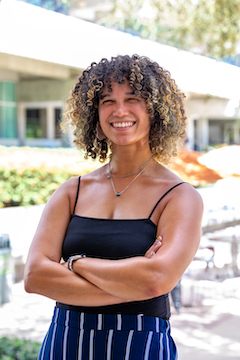 Born in Carolina, Puerto Rico, Angelique Rosa Marin is currently pursuing her doctorate in marine geoscience at the Rosenstiel School of Marine and Atmospheric Science.
Born in Carolina, Puerto Rico, Angelique Rosa Marin is currently pursuing her doctorate in marine geoscience at the Rosenstiel School of Marine and Atmospheric Science.
Rosa Marin researches the use of protists—an organism—as reef indicators. She is also practicing cultural relevant science communication. When she is not working hard in the lab, she is connecting with her followers on social media helping to amplify reef management strategies and delivering important information to underrepresented communities.
“My goal is to provide innovative monitoring tools to enhance global reef management and create inclusive content for the public,” said Rosa Marin. “I’m highly passionate about science communication and sharing the information that I learn in both English and Spanish.”
In August, the McKnight cohort attended a two-day orientation in Tampa, Florida. Rosa Marin noted that the meeting was one of the most electrifying experiences ever.
“I’m usually very critical but this conference was amazing,” said Rosa Marin. “I felt the support and it was nice to be face-to-face and in a room full of Ph.D. students from different disciplines—and having a chance to engage with leaders of the program.”
Dissertation fellowship awardees:
Brittney Davis
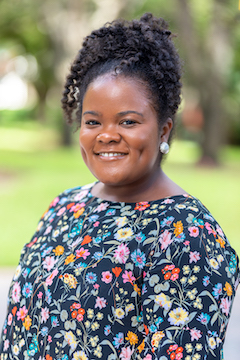 At first, Brittney Davis was happy and content being a high school teacher after graduating from Virginia Tech with her bachelor’s degree in English and then a master’s degree in education. However, after years of teaching, she felt her impact could reach more students and impact them by changing the system from within.
At first, Brittney Davis was happy and content being a high school teacher after graduating from Virginia Tech with her bachelor’s degree in English and then a master’s degree in education. However, after years of teaching, she felt her impact could reach more students and impact them by changing the system from within.
Davis’ burning passion led her to pursue a doctorate in community psychology to create and amend policies that specifically impacted Black and brown students all over the nation. She is enrolled in the Richard J. Kurtz Family Community Well-Being Doctoral Program in the School of Education and Human Development.
“I was doing all this work in my classroom, but it was not really helping because even within this small microcosm of people, there were people that were actively undoing the work that I was doing,” said Davis, who is originally from Prince George’s County in Maryland.
That work included engaging and understanding her students, engaging in informed practices, and boosting her students’ cultural racial pride.
Today, Davis’s work will allow her to investigate systems and how they impact people of color and communities in general. The goal of her research is to investigate the remote learning experiences of gifted Black middle school students.
“I’m looking into the remote learning environment and what implications there are for Black boys and girls and continuing this change,” Davis said. “There has been a radical shift in education so this is something that I’m really interested in.”
Elisabeth Jeffrey
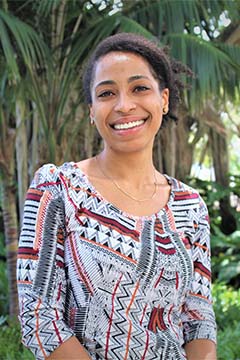 Elisabeth Jeffrey hit the ground running in the University of Miami’s biochemistry and molecular biology doctoral program.
Elisabeth Jeffrey hit the ground running in the University of Miami’s biochemistry and molecular biology doctoral program.
After earning a Master of Science from the Miller School of Medicine, where she conducted research of gut bacteria and fungi on gastrointestinal diseases prevalent after spinal cord injuries, she decided to continue the work she began on a higher level. She’s currently continuing the research because she’s interested in positively contributing to something that will help others long term.
“Rather than picking a project that was basic research, I picked a project that was more translational,” she said. “This research is personal because I wanted to improve the quality of life for those with traumatic spinal cord injury.”
Growing up, Jeffrey was made to believe that she wasn’t “good enough” for science. Thanks to positive reinforcement from caring teachers, mentors, and professors, she has overcome every obstacle that was thrown in her path. She wants others who may be facing similar hurdles to know that staying the course and gaining a support group is vital to succeeding.
“The McKnight community is a very close-knit group and full of support,” said Jeffrey, who first applied to the program in 2017 and received the award on her second attempt. “It is a unique environment that I think is going to help me personally and professionally.”
Monique McKenney
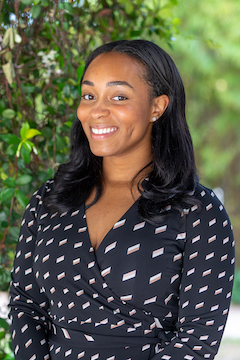 In her fifth year of her doctoral program in counseling psychology in the School of Education and Human Development, Monique McKenney is nearly at the finish line.
In her fifth year of her doctoral program in counseling psychology in the School of Education and Human Development, Monique McKenney is nearly at the finish line.
“My research focuses on how Black youth and their caregivers engage in communication on race and racial incidents, defined as the process of racial socialization,” said McKenney. “I am motivated to pursue this line of research to contribute to the strengths-based literature on Black families.”
As this chapter in her life is nearing completion, she looks back on the many people who have contributed to her ability to secure such a fellowship.
“I am thankful to have this village throughout my graduate school journey,” she said, naming several people from the school and University of Michigan.
As a McKnight fellow, McKenney is excited to connect and learn about the other scholars around Florida.
“I am in awe of the other fellows and their research in this network and look forward to building relationships and potentially collaborating,” she said. “I see this community as incredibly valuable to me both personally and professionally.”
